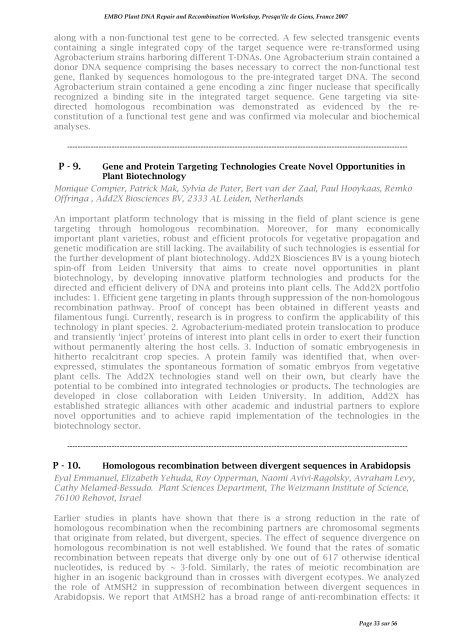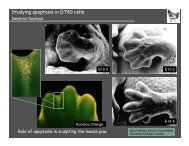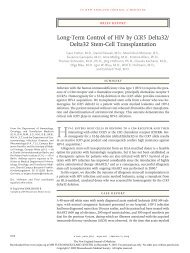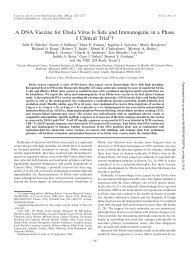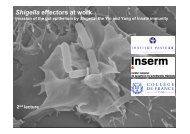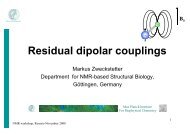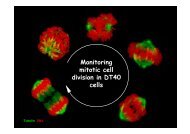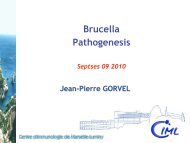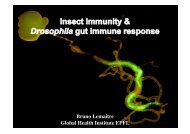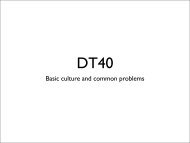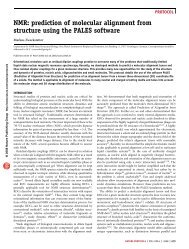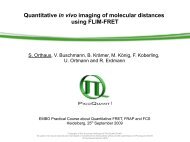pdf file - Events - EMBO
pdf file - Events - EMBO
pdf file - Events - EMBO
You also want an ePaper? Increase the reach of your titles
YUMPU automatically turns print PDFs into web optimized ePapers that Google loves.
<strong>EMBO</strong> Plant DNA Repair and Recombination Workshop, Presqu'île de Giens, France 2007<br />
along with a non-functional test gene to be corrected. A few selected transgenic events<br />
containing a single integrated copy of the target sequence were re-transformed using<br />
Agrobacterium strains harboring different T-DNAs. One Agrobacterium strain contained a<br />
donor DNA sequence comprising the bases necessary to correct the non-functional test<br />
gene, flanked by sequences homologous to the pre-integrated target DNA. The second<br />
Agrobacterium strain contained a gene encoding a zinc finger nuclease that specifically<br />
recognized a binding site in the integrated target sequence. Gene targeting via sitedirected<br />
homologous recombination was demonstrated as evidenced by the reconstitution<br />
of a functional test gene and was confirmed via molecular and biochemical<br />
analyses.<br />
----------------------------------------------------------------------------------------------------------------------------------<br />
P - 9. Gene and Protein Targeting Technologies Create Novel Opportunities in<br />
Plant Biotechnology<br />
Monique Compier, Patrick Mak, Sylvia de Pater, Bert van der Zaal, Paul Hooykaas, Remko<br />
Offringa , Add2X Biosciences BV, 2333 AL Leiden, Netherlands<br />
An important platform technology that is missing in the field of plant science is gene<br />
targeting through homologous recombination. Moreover, for many economically<br />
important plant varieties, robust and efficient protocols for vegetative propagation and<br />
genetic modification are still lacking. The availability of such technologies is essential for<br />
the further development of plant biotechnology. Add2X Biosciences BV is a young biotech<br />
spin-off from Leiden University that aims to create novel opportunities in plant<br />
biotechnology, by developing innovative platform technologies and products for the<br />
directed and efficient delivery of DNA and proteins into plant cells. The Add2X portfolio<br />
includes: 1. Efficient gene targeting in plants through suppression of the non-homologous<br />
recombination pathway. Proof of concept has been obtained in different yeasts and<br />
filamentous fungi. Currently, research is in progress to confirm the applicability of this<br />
technology in plant species. 2. Agrobacterium-mediated protein translocation to produce<br />
and transiently ‘inject’ proteins of interest into plant cells in order to exert their function<br />
without permanently altering the host cells. 3. Induction of somatic embryogenesis in<br />
hitherto recalcitrant crop species. A protein family was identified that, when overexpressed,<br />
stimulates the spontaneous formation of somatic embryos from vegetative<br />
plant cells. The Add2X technologies stand well on their own, but clearly have the<br />
potential to be combined into integrated technologies or products. The technologies are<br />
developed in close collaboration with Leiden University. In addition, Add2X has<br />
established strategic alliances with other academic and industrial partners to explore<br />
novel opportunities and to achieve rapid implementation of the technologies in the<br />
biotechnology sector.<br />
----------------------------------------------------------------------------------------------------------------------------------<br />
P - 10. Homologous recombination between divergent sequences in Arabidopsis<br />
Eyal Emmanuel, Elizabeth Yehuda, Roy Opperman, Naomi Avivi-Ragolsky, Avraham Levy,<br />
Cathy Melamed-Bessudo. Plant Sciences Department, The Weizmann Institute of Science,<br />
76100 Rehovot, Israel<br />
Earlier studies in plants have shown that there is a strong reduction in the rate of<br />
homologous recombination when the recombining partners are chromosomal segments<br />
that originate from related, but divergent, species. The effect of sequence divergence on<br />
homologous recombination is not well established. We found that the rates of somatic<br />
recombination between repeats that diverge only by one out of 617 otherwise identical<br />
nucleotides, is reduced by ~ 3-fold. Similarly, the rates of meiotic recombination are<br />
higher in an isogenic background than in crosses with divergent ecotypes. We analyzed<br />
the role of AtMSH2 in suppression of recombination between divergent sequences in<br />
Arabidopsis. We report that AtMSH2 has a broad range of anti-recombination effects: it<br />
Page 33 sur 56


